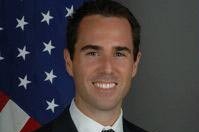Daniel Baer, an openly gay official with the U. S. Department of State, has spent the last two years working on human-rights cases throughout the globe — an arena he said is becoming increasingly more focused on LGBT-rights work, in part due to the United States’ lead.
Baer will be a keynote speaker at the National Lesbian and Gay Journalists Association’s convention this weekend in Philadelphia, where he will address the recent international LGBT triumphs and setbacks and discuss the role American media can play in shining a light on LGBT-rights struggles.
Baer was appointed in November 2009 as Deputy Assistant Secretary in the Bureau of Democracy, Human Rights and Labor, where he oversees such units as the Offices of East Asian Pacific Affairs, African Affairs and Multilateral and Global Affairs.
As an openly gay federal employee, Baer said he’s found the environment to be welcoming to LGBT staffers.
“I can’t speak for the whole federal government, but I think the president has made policy changes that signal to everyone in federal government that he’s committed to an open atmosphere,” he said. “But also within the State Department, the secretary has made it clear on numerous occasions that she’s making LGBT human rights a central plank of foreign policy and internally has made a commitment to LGBT equality.”
Baer said Secretary of State Hillary Clinton, with whom he has direct contact every few weeks, has attended Pride events within the department and met with LGBT employee group Gays and Lesbians in Foreign Affairs Agencies, in addition to overseeing the implementation of policy changes like last year’s expansion of benefits for same-sex domestic partners of LGBT State Department employees.
That commitment to LGBT equality has also been reflected in such efforts as the United States’ strong backing of this summer’s United Nations Human Rights Council resolution on LGBT rights, the first ever of its kind.
Baer was in the room when the council approved the measure and said he was impressed by the emotional nature of the occasion.
“It was more moving than I had expected. I was actually surprised at myself,” he said. “There are a lot of times where things the UN does can seem disconnected from our day-to-day, but this really was a moment where the voice of the international community was speaking out for the first time ever about LGBT human rights. Those of us who work on these issues every day have to remind ourselves how quickly progress can be made and how quickly it is being made, and this was one of those moments where you had to stop and say, ‘Wow, this is really outstanding.’”
While the United States has been working to engage policymakers and civilians abroad to alleviate LGBT-rights violations, it is often tasked with doing so in countries where homophobia may be deeply ingrained.
“It is challenging, but that doesn’t mean we shouldn’t or don’t do the work that needs to be done. You don’t sign up for any aspect of foreign-policy work because you want something easy; the challenge is part of what’s rewarding,” he said. “You just have to think tactically about what the most productive way to engage is and then pave the groundwork for respectful conversations that will lead to progress in the long run.”
Since Clinton came into office, Baer said, she’s done an effective job of making sure those initial conversations are taking place.
“She’s making it clear to ambassadors that this is part of our human-rights policy and having these conversations on LGBT issues is part of their jobs. The first conversation is always challenging, but it makes the second and third ones easier.”
While momentum has been building around international LGBT-rights issues in recent years, Baer said American journalists can also play a role in furthering those discussions.
By examining the conditions faced by LGBTs outside of the American borders, Baer said the media can raise awareness that can be integral to stemming rights violations.
“Human-rights policy is best when it starts with the facts, and I think journalists can play a critical role in helping to shape those policies by creating a record of facts. One of the things that perhaps gets under-recognized is how important it is that when we don’t know the stories about the people whose rights are being violated, it’s difficult to protect them and build the political coalitions it takes to make changes to policies or laws,” Baer said. “Throughout the history of our foreign policy, public opinion has had, as it should, an effect on government priorities and actions so journalists can play a role in marshaling facts and disseminating them to the public, so citizens can make inquiries and demands of the legislators and so that the executive branch can pay attention to issues and make progress. The media plays a role in marshaling public opinion not only within the United State but around the world and can help spotlight urgent human-rights issues.”
Jen Colletta can be reached at [email protected].
